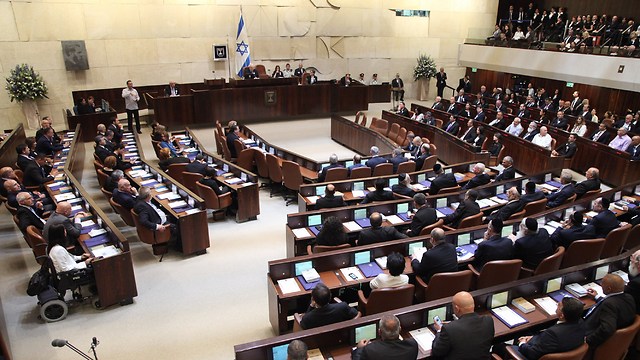
Head of Arab party only Arab lawmaker to stay for national anthem
The majority of Israel's Arab lawmakers walked out of the Knesset inauguration ceremony when the national anthem was played – except Ayman Odeh, head of the Joint Arab List.
The head of Israel's sole Arab political party – the Joint Arab List – was the only member of his party to remain in the Knesset as the national anthem was sounded to mark the end of inauguration ceremony Tuesday.
Israel's Arab and ultra-Orthodox politicians have traditionally boycotted certain parts of the swearing-in ceremony in line with their general refusal to accept Zionism. While the Arab politicians usually walk out during the national anthem, both have historically contested the wording of their oath as lawmakers – which demands they vow to defend Israel as a Zionist state.
This year, both sides said their oaths without incident, but members of both the Joint Arab List and the Haredi parties Shas and United Torah Judaism refused to don the blue-and-white ribbon,
During the national anthem, all most all of Israel's Arab Knesset members walked out of the plenum, as part of their refusal to accept the phrase "A Jewish soul still yearns" which they view as a slight to the local Arab population.
Odeh, who comes from the leftwing Hadash faction of the Joint Arab List, the only faction which has Jewish members, remained in the plenum and even stood, but refused to sing along with the song he also describes as exclusionary.
"I chose to remain and stand in silence. That was my protest against an anthem which does not represent me, which for me is the symbol of exclusion," Odeh said.
Israeli Arabs are descendants of residents who stayed put during the 1948 war of Israel's founding, in which hundreds of thousands of fellow Palestinians fled or were forced to leave their homes, ending up in Jordan, Lebanon and Syria as well as in Gaza, the West Bank and East Jerusalem.
Those who remained have long pointed to inferior services and unfair allocations for education, health and housing. More than half of the Arabs in Israel live below the poverty line.
Arab citizens make up about 15 percent of eligible voters, which means they have an electoral potential of 18 seats – though they received only 13 seats in the elections.











